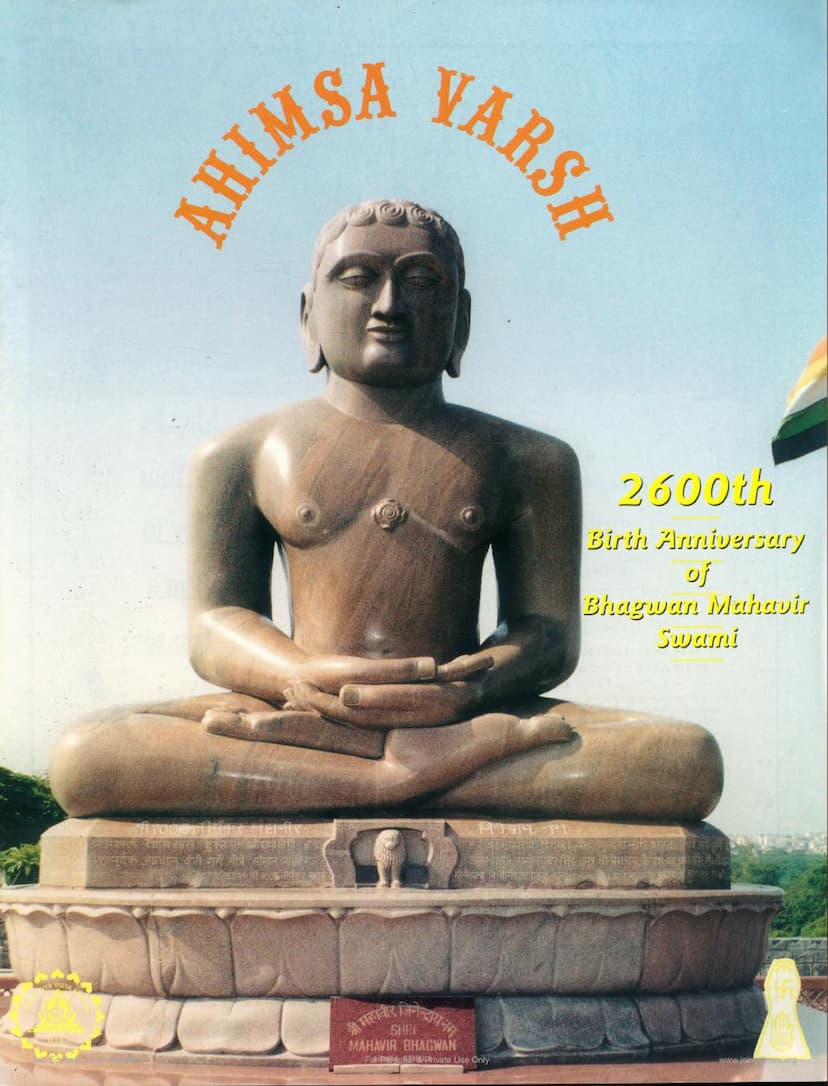Ahimsa Varsh 2600th Birth Anniversary Of Mahavir Swami
Added to library: September 1, 2025

Summary
This document appears to be a souvenir booklet or program commemorating the 2600th Birth Anniversary of Bhagwan Mahavir Swami, celebrated as the Year of Non-Violence (Ahimsa Varsh). The event was organized by the Bharatiya Vidya Bhavan, USA and took place on April 13th and 14th, 2002, at the Royal Albert's Palace in Fords, New Jersey.
The publication is a comprehensive collection of messages, articles, and program details highlighting the significance of Bhagwan Mahavir and the principle of Ahimsa (non-violence).
Here's a breakdown of the key themes and content:
1. Commemoration of Bhagwan Mahavir's 2600th Birth Anniversary:
- The core purpose of the publication is to celebrate this significant milestone in the life of Bhagwan Mahavir, the 24th Tirthankara of Jainism.
- The event aimed to propagate his teachings, particularly Ahimsa, as a universal message for peace and harmony.
2. The Centrality of Ahimsa (Non-Violence):
- Ahimsa is repeatedly emphasized as the supreme dharma (virtue) in Jainism, as taught by Bhagwan Mahavir.
- It's described not just as not harming living beings, but as a comprehensive philosophy encompassing non-violence in thought, word, and deed.
- The publication explores the relevance of Ahimsa in contemporary times, especially in the context of global conflicts, terrorism, and environmental issues.
- Several articles and messages draw parallels between Mahavir's teachings and the non-violent movements led by figures like Mahatma Gandhi, Martin Luther King Jr., and Nelson Mandela.
3. Key Figures and Supporters:
- Patrons-in-Chief: Shri Atal Bihari Vajpayee (Prime Minister of India) and Shri R. Venkataraman (Former President of India, President of Bharatiya Vidya Bhavan).
- Chairman of the International Celebration Committee: Dr. L. M. Singhvi.
- Organizing Committee and Advisors: A long list of individuals and spiritual leaders (monks, sadhus, sadhvis, scholars) are acknowledged for their involvement.
- Sponsors and Supporters: Numerous Jain organizations (JAINA, YJA, various Jain Centers) and corporations (New York Life Insurance Company, Bank of Baroda, Bank of India, Air India, TV Asia) are thanked for their generous support.
4. Content and Themes within the Publication:
- Messages from Dignitaries: The publication features messages from prominent figures in India and the US, including the Vice-President of India (Krishan Kant), the Home Minister of India (L.K. Advani), and the Minister of Human Resources Development (Dr. Murli Manohar Joshi). These messages underscore the importance of Mahavir's teachings for global peace and ethical living.
- Articles on Jainism and Ahimsa:
- Dr. N.P. Jain (former Ambassador) writes about Jainism as one of the oldest religions, its core tenets of Ahimsa and Aparigraha, and the concept of "Parasparopagraho Jeevanam" (mutual support of life).
- Dr. Kumarpal Desai elaborates on Ahimsa as the heart of Jainism, its scientific basis, and its evolution from Mahavir to Mahatma Gandhi. He also discusses the influence of Shrimad Rajchandra on Gandhiji's philosophy of Ahimsa.
- Acharya Sushil Kumarji Maharaj emphasizes Ahimsa as a powerful force for peace and unity, advocating for a non-violent army of peace and contentment.
- Gurudev Shree Chitrabhanuji highlights India's spirit of compassion and universal love, aligning it with Jain principles.
- Acharya Mahapragna discusses the economics of Lord Mahavir, focusing on the principles of limitation of desire, consumption, and the purity of means in economic development.
- Pravin K. Shah details Lord Mahavir's life, his philosophy, and the five great vows of Jainism.
- Pravin C. Shah introduces Shri Virchand Raghavji Gandhi as the first Jain messenger of non-violence to the West.
- Rajiv Jain offers an interpretation on "A Way to Stop Inflow of Karma" through daily scripture reading (Swadhyaya) and meditation.
- Naresh Jain reflects on the post-September 11th world and the heightened relevance of Jainism's message of Ahimsa and mutual support.
- Program Details: The booklet outlines the detailed two-day program, including:
- Opening ceremonies with prayers and addresses.
- Keynote speeches by distinguished scholars and leaders.
- Seminars on "Ahimsa and Spiritual Resurgence."
- Release of books on Jainism and Ahimsa.
- Presentations on "Ahimsa and Ecology," "Journey of Ahimsa - Mahavir to Mahatma Gandhi."
- Awards (Ahimsa Ratna, Sewa Ratna, Awards of Excellence) presented to individuals who have contributed to the promotion of Ahimsa and Indian culture.
- Cultural programs featuring dance, drama, and music.
- A "Tribute to September 11" performance.
- Declaration on Ahimsa: A significant section is dedicated to a "Declaration on Ahimsa," where signatories pledge to commit to and propagate the culture of non-violence, urge the UN to include this concept in its charter, and promote grass-root activities for peace and harmony.
- Honorees and Awardees: The publication introduces individuals being honored for their dedication to Ahimsa and serving the Indian community, including Dr. Mahendra K. Pandya, Devendra Tokarshi Peer, Shri Kiranbhai Panekh, Shri Kantilal M. Parekh, Mr. Seymour Sternberg, Dr. Atul Chokshi, and Shri Bharat Bala.
- Financial Support: Acknowledgment of various sponsors and philanthropists who made the event possible, underscoring the widespread support for the message of Ahimsa.
- Congressional Record Mention: The inclusion of a Congressional Record entry from Hon. Frank Pallone Jr. praising the Year of Non-Violence and Lord Mahavir's teachings highlights the recognition of Jain principles in broader political discourse.
In essence, the book is a testament to the enduring relevance of Bhagwan Mahavir's teachings, particularly the principle of Ahimsa, and its potential to foster peace, harmony, and ethical living in the world. It showcases the efforts of the Jain community and supporting organizations in spreading this vital message.